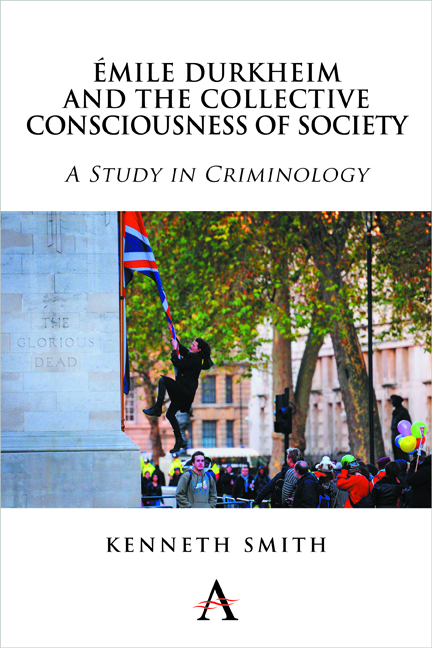Book contents
- Frontmatter
- Dedication
- Contents
- Epigraph
- Preface
- Introduction
- Part I The Concept of the Collective Consciousness of Society
- Part II The Form of the Collective Consciousness
- Part III Durkheim on Crime and Punishment
- Preface to Part III
- Introduction to Part III
- 8 Durkheim on Crime and Punishment in The Division of Labour in Society
- 9 Durkheim on Crime and Punishment in The Rules of Sociological Method
- 10 Interregnum on Suicide (1897)
- 11 Durkheim's Undeservedly Famous ‘Two Laws of Penal Evolution’ Essay (1901)
- 12 Durkheim on Crime and Punishment in Moral Education (1902-03)
- Conclusion to Part III
- Part IV Social Fact or Social Phenomenon? Durkheim's Concept of the Collective Consciousness as a ‘Social Fact’
- Part V Some Problems with Durkheim's Concept of the Common and Collective Consciousness
- Conclusion
- Appendix: On Paying a Debt to Society
- Notes
- References
- Index
Introduction to Part III
from Part III - Durkheim on Crime and Punishment
Published online by Cambridge University Press: 05 October 2014
- Frontmatter
- Dedication
- Contents
- Epigraph
- Preface
- Introduction
- Part I The Concept of the Collective Consciousness of Society
- Part II The Form of the Collective Consciousness
- Part III Durkheim on Crime and Punishment
- Preface to Part III
- Introduction to Part III
- 8 Durkheim on Crime and Punishment in The Division of Labour in Society
- 9 Durkheim on Crime and Punishment in The Rules of Sociological Method
- 10 Interregnum on Suicide (1897)
- 11 Durkheim's Undeservedly Famous ‘Two Laws of Penal Evolution’ Essay (1901)
- 12 Durkheim on Crime and Punishment in Moral Education (1902-03)
- Conclusion to Part III
- Part IV Social Fact or Social Phenomenon? Durkheim's Concept of the Collective Consciousness as a ‘Social Fact’
- Part V Some Problems with Durkheim's Concept of the Common and Collective Consciousness
- Conclusion
- Appendix: On Paying a Debt to Society
- Notes
- References
- Index
Summary
It is a very rare event indeed when Durkheim admits that he changed his mind on anything, let alone one of his core sociological beliefs. Amongst scholars who have considered this question Durkheim is widely thought to have only ever acknowledged that he significantly changed his theoretical viewpoint on one issue: the all-important role of religion in society (Gouldner 1967, 14; Cotterrell 1999, 49 [citing Alexander 1982, 255]; Fournier 2012, 201). In fact, however, a careful reading of Durkheim's writings on crime and punishment show that he changed his mind on this issue repeatedly too, and, what is more, remarkably enough, he even admitted this himself at one point in The Rules of Sociological Method (1964, 72).
In The Division of Labour and even in The Rules Durkheim expresses his view on the subject of crime and punishment very authoritatively indeed, much more so than he does in any of his later writings on these questions, but especially in his much more tentative 1901 essay entitled ‘Two Laws of Penal Evolution’ or in the series of lectures delivered by him in 1902–03 and later collected together as Moral Education. Sometimes Durkheim restates his earlier view unchanged, but quite often these are radically altered from one publication to the next, usually without any acknowledgement of this fact, and what he says does not then always amount to a consistent whole. In fact, these differences are so great that I will go so far as to claim (see Part V of this study) that there is a significant division on this issue – amounting perhaps to what Althusserian Marxists used to call an ‘epistemological break’ – between Durkheim's earlier writings on this subject of crime and punishment and what he has to say later on these subjects.
- Type
- Chapter
- Information
- Publisher: Anthem PressPrint publication year: 2014

